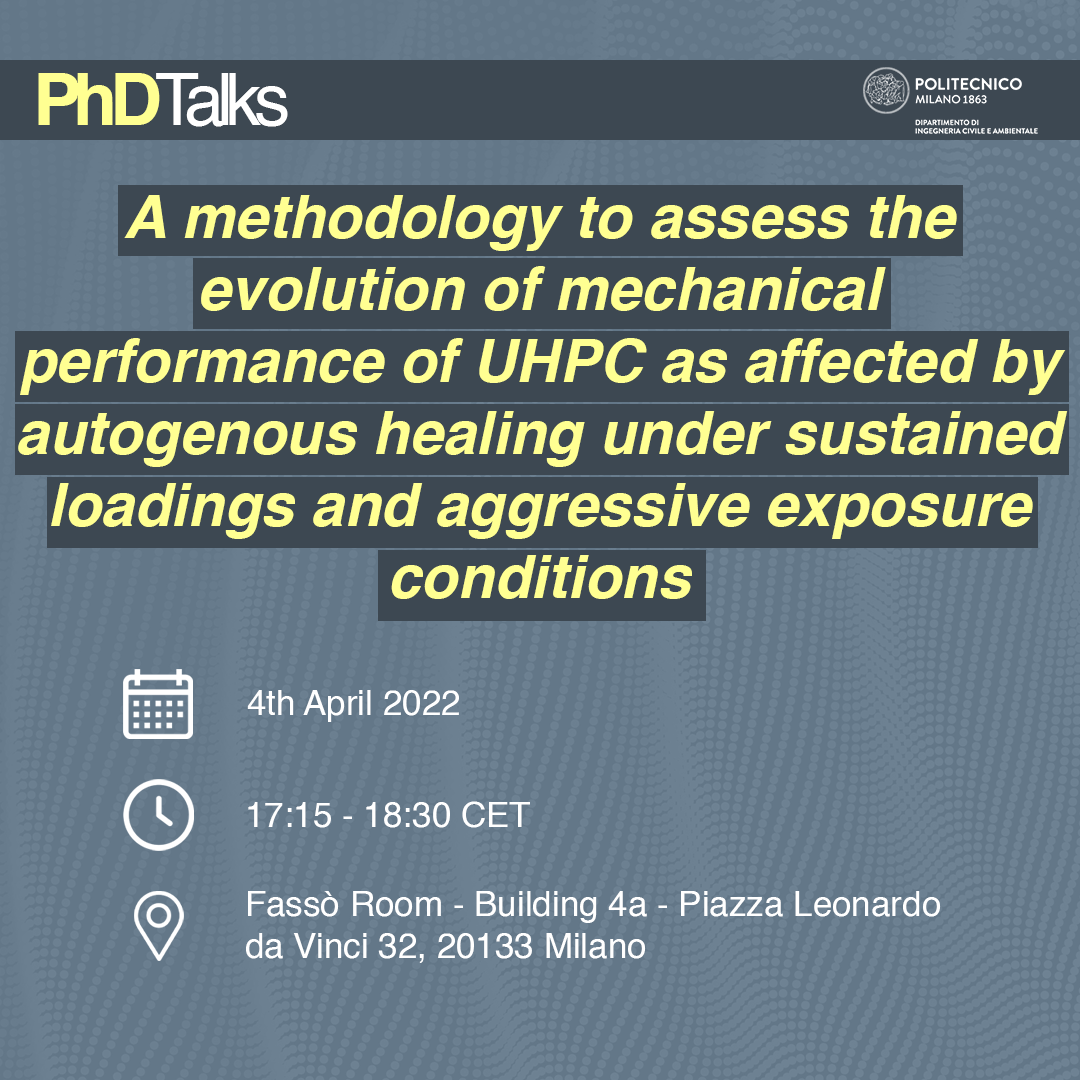
- This event has passed.
PhDTalks | A methodology to assess the evolution of mechanical performance of UHPC as affected by autogenous healing under sustained loadings and aggressive exposure conditions
4 April 2023 @ 17:15 - 18:30

The PhDTalks seminar series resumes with the first appointment of 2023 to be held on Tuesday 4 April, from 17:15 to 18:30 CET in the Fassò room (Building 4a – Piazza Leonardo da Vinci, 32).
PhDTalks is a series of seminars and discussions between PhD students. The events aim to provide a place to network among PhD students and get in touch with the many projects developed in our department.
On this occasion, the seminar will be conducted by Marco Davolio and the title of the speech will be “A methodology to assess the evolution of mechanical performance of UHPC as affected by autogenous healing under sustained loadings and aggressive exposure conditions“.
It will also be possible to follow the event online by accessing the WebEx room.
Abstract:
This study investigates the evolution of the performance of an Ultra-High Performance Concrete (UHPC) under simultaneous action of sustained loading and aggressive environmental exposure. UHPC mixes were investigated containing different functionalising micro- and nano-scale components to promote autogenous self-healing. In order to assess the healing capabilities in the different multi-action scenarios and the evolution of the mechanical response of the material over time, a tailored methodology was implemented, including non-destructive and destructive tests performed all along the scheduled exposure/healing times up to 12 months. In particular, an innovative set-up was designed to reproduce on the specimens the sustained flexural loading conditions a structure undergoes during its service life; the load was applied simultaneously with each of the three selected different exposures, to simulate the chloride and sulphate aggressive environments, besides a reference one. Multiple indices were defined to quantify the self-healing efficiency, which were further calibrated against experimental microscope crack observation as well as cross correlated with each other, as a further proof of the reliability of the proposed methodology. Two nominally identical specimens were tested for each condition, the first in four-point bending and the second in direct tension. To compare the results, a simplified five-point inverse analysis was adapted for beams with different slenderness, providing a quadrilinear constitutive law derived from the structural flexural behaviour of four-point bending tests. The results confirmed the material durability, especially in the cracked state, through its capacity of sealing the cracks and restoring original properties in short periods and preserving its load bearing capacity, thus providing solid argument for UHPC as the ideal candidate material for highly durable and sustainable structural applications in aggressive scenarios.
Speaker’s bio:
Marco is a Ph.D. Candidate in Structural, Seismic, and Geotechnical Engineering (38th cycle) at Politecnico di Milano. He has BSc and MSc in Building Engineering and experience as a structural designer in a professional studio. Marco is currently developing carbon capture and uptake strategies for cementitious materials to reduce the environmental impact of the concrete construction industry. He is also cooperating with international companies such as Cemex and Energy Vault for the experimental fatigue characterization of Steel Fibre Reinforced Concretes and studying self-healing of Ultra-High Performance Concretes in the framework of European projects.
